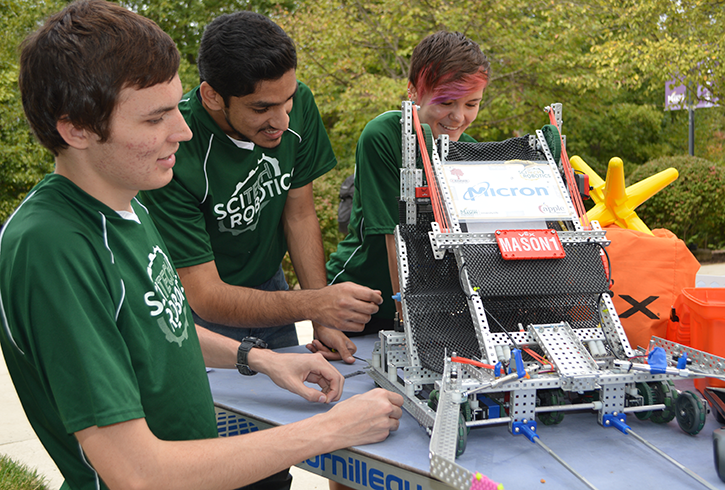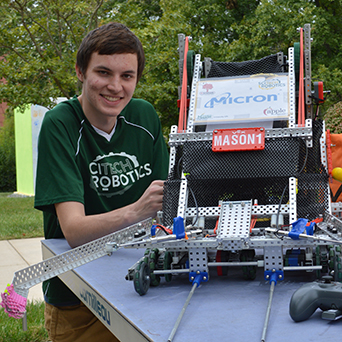
Mason's robotics team won third place in a world championship last spring. Pictured here are team members Joseph Spanbauer (left), Afnan Ali, and Payton Blodgett.
Our goal is to do it better than any other university in the world.
Josef Spanbauer
Mason Engineering’s robotics team is gearing up to take on the world.
Last spring, the team finished third in a world championship competition in Louisville, Kentucky, winning all its matches against teams from other universities in the United States and around the world before losing to China. New Zealand came in first place.
It was an amazing experience to win so many matches at an international competition in front of thousands of spectators, says team manager Afnan Ali, a sophomore majoring in computer engineering. “There was a rush of ‘wow, we did it.’”
The team’s goals for this year dwarf last year’s, says Josef Spanbauer, a Northern Virginia Community College student who’ll be dual enrolled in Mason and NOVA next semester as a mechanical engineering major. “Our goal is to do it better than any other university in the world.”
This may sound like a tall order, but this group isn’t afraid of challenges.
Spanbauer, one of the team’s founding members, spent the summer designing the new robot to compete in VEX U competitions this winter and spring, and the members have already built the first version of it. Their challenge is to create a robot that can pick up and stack cones onto a mobile device on a game field faster than robots from competing teams.
To accomplish their goals, they often work long days every Friday, Saturday, and Sunday at Mason’s Science and Technology Campus in Manassas. “If I am not working, studying, or in class, I’m doing something with robotics. We love what we’re doing and have fun while we’re at it," Spanbauer says.
It’s a real team atmosphere, he says. “For instance, if someone puts a motor on backwards, we don’t hassle them. We all support each other.”
Payton Blodgett, a mechanical engineering major who is in charge of the engineering notebook, which documents the design process, says members are focused and passionate. “When we’re working, we’re all in the zone,” she says.

Josef Spanbauer, a founding member of the robotics team, runs the robot during competitions.
During the competitions, the robot runs autonomously for 45 seconds, then Spanbauer runs the robot for one minute and 15 seconds. “There is a lot of planning, strategy, and programming involved,” he says.
Ali agrees. The team sends out scouts to watch other teams and then report back what they’ve observed, he says.
Chinese observers were so impressed with Mason’s robotics team that they invited the group to an Asian-Pacific competition at the end of December. The Chinese government is paying for the trip, except for the airfare.
The team represents the broad appeal and exposure mechanical engineering has among students, says Oscar Barton Jr., chair of the Department of Mechanical Engineering and supervisor of the team. “It is a multidisciplinary project bringing together elements of electrical, computer, and mechanical engineering.”
Micron, a Boise, Idaho-based global leader in the semiconductor industry, is the group’s primary sponsor. In addition, Apple Federal Credit Union and University Life are providing support this year.
The team is recruiting new members. “Eventually we are all going to graduate, and we don’t want to see the team become just a room full of parts,” Spanbauer says. “We want to find the passionate engineers who want to apply their knowledge and compete against something that’s much bigger in an international competition.”
It is a multidisciplinary project bringing together elements of electrical, computer, and mechanical engineering.
Oscar Barton Jr., chair of the Department of Mechanical Engineering
